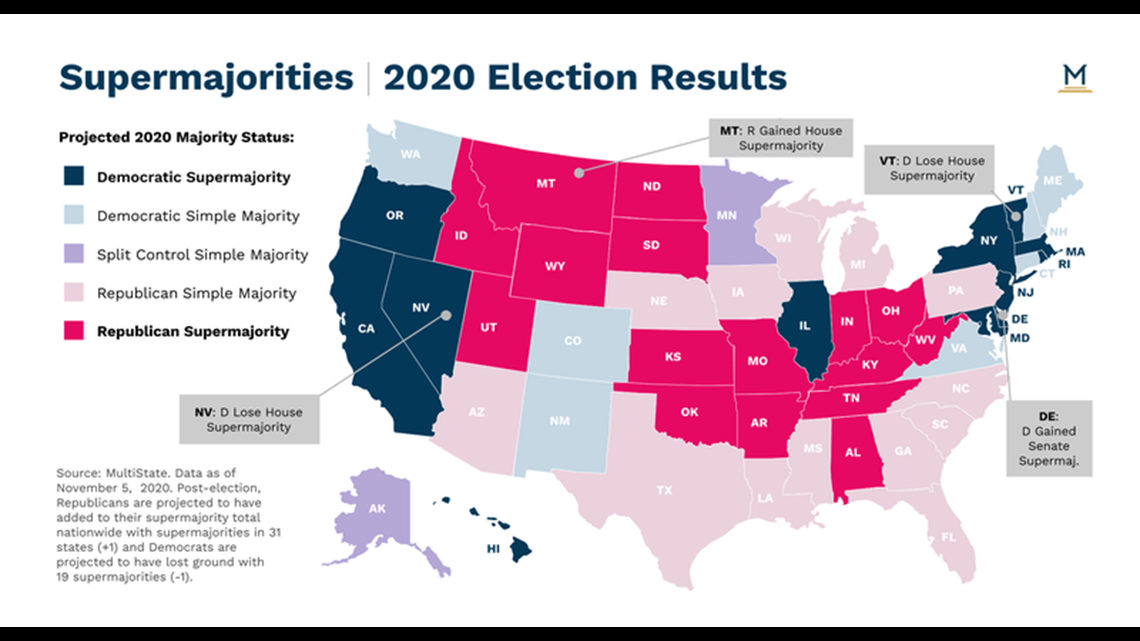PORTLAND, Ore. — Oregon Democrats are poised to maintain their three-fifths supermajority in the state legislature, outnumbering Republicans 37-23 in the House and 18-12 in the Senate.
Democrats had hoped to secure a two-thirds supermajority — the amount of people that need to be present to vote on legislation — to prevent the Republican walkouts that have halted legislative business in recent years.
Yet, they fell short, barely holding onto their Senate supermajority and losing a net one seat to the Republicans in the House.
With Oregon Democrats still vulnerable to Republican walkouts, why does it matter that they held onto their supermajorities?
Holding three-fifths majorities means Democrats can pass revenue-related bills without Republican support. For example, in 2019, the Oregon Legislature passed a $1 billion tax package to fund education, despite Republican opposition.
The Democrats will also largely control next year’s redistricting process: the redrawing of state and national electoral lines after the decennial census. The stakes are high, as Oregon could receive a sixth U.S. congressional seat.
KGW political analyst Len Bergstein highlights that state law forbids lines from being drawn to favor a political party and said that the process seems to be becoming increasingly nonpartisan in Oregon.
According to Bergstein, the supermajority does give Democrats the power to direct the legislative agenda and flexibility when it comes to consensus building.
“There's room within the caucus for people to take a variety of different positions and maybe avoid a very tough vote — the Democrats have still got the majority,” Bergstein said.
On the other hand, the larger a majority, the harder it can be to wrangle the caucus. For example, party divisions have recently come to the floor as Rep. Janelle Bynum challenged House Speaker Tina Kotek for her seat.
And with only a three-fifths supermajority, the Democrats may still be vulnerable to Republican walkouts. In recent sessions, Republicans have walked out numerous times to protest the Democrat-supported cap-and-trade bill, among other issues.
But Bergstein said with multiple crises in Oregon, from the pandemic to wildfires, the demand for legislation might overtake political tactics like walkouts.
“If (Republicans) continue to walk away on a broad range of those very big ticket items, I think they're going to be talking to a narrower and narrower constituency, and they're going to render themselves kind of obsolete,” he said.
Regardless, Bergstein said that though Democrats did not reach their goal of a two-thirds majority, they seemed to view the election as a success. The supermajority is, in part, symbolic of Oregonians' political views.
“One of the key messages is that Oregonians, in general, are happy with the direction they're going in terms of the democratic agenda,” he said.
Oregon Democrats have held supermajorities since 2018. How common are supermajorities in state legislatures?
Pretty common. 27 states now have either three-fifths or two-thirds supermajorities in one or more chambers, with the majority of them being Republican.
Republicans are projected to now have supermajorities in 31 state legislative chambers, while Democrats have 19 supermajorities in state chambers, according to Multistate analysis.


State legislatures have historically been dominated by Republicans, and Democrats largely failed in their goal to ride a “blue wave” to state legislature victories this year.
Democrats did secure the supermajority in the Delaware senate but lost their supermajorities in the Nevada and Vermont houses. Meanwhile, Republicans kept all of their supermajorities and added one in the Montana House.
Supermajorities are sometimes important when it comes to overriding gubernatorial vetoes, though the size of the majority needed to exercise this power varies from state to state.
Some legislatures only need a simple majority to override vetoes, while other legislatures — like Oregon’s — need a two-thirds majority to exercise this power. With only a three-fifths majority, Oregon Democrats are unable to override the governor’s vetoes, though this power is rarely needed with the sitting governor being a Democrat.
Supermajorities can be especially influential when the sitting governor is of the opposite political party than the supermajority, effectively neutralizing the governor’s veto power.



